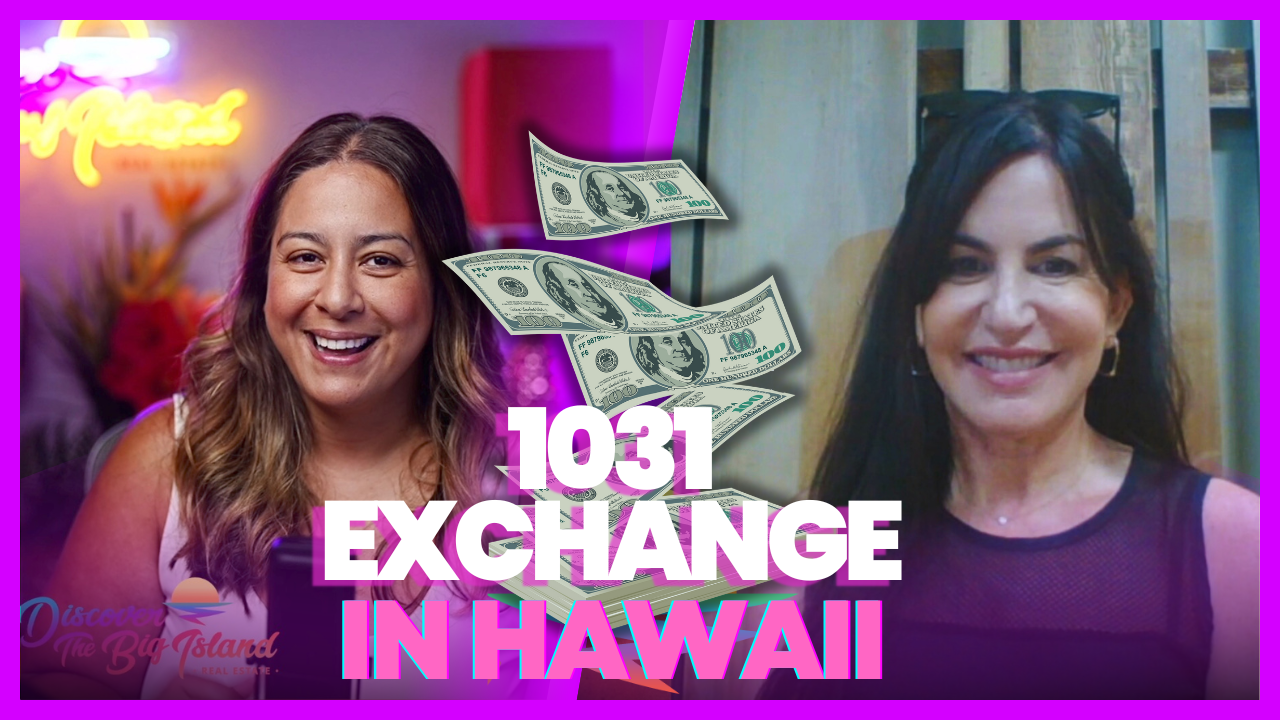What is a 1031 Exchange?
A 1031 exchange is a tax-deferred transaction that replaces one or more real estate properties (known as the relinquished property) with one or more like-kind properties (known as the replacement property) without the realization of a gain. But don’t be fooled by the tax deferment – if you sell the replacement property without conducting another 1031 exchange, taxes could come knocking.
How does it work?
A Qualified Intermediary or Accommodator is used to ensure the property is sold, without the owner receiving any money and paying taxes at that time. Title and escrow companies can also function as Qualified Intermediaries. It’s the QI’s job to hold the money, adhere to deadlines, and disperse funds accurately. Fortunately, Hawaii has many companies providing QI services to ensure the transaction moves smoothly and without hassle.
What properties qualify for an exchange?
A property must fulfill three rules to qualify for an exchange:
– Qualified use: Both the relinquished and replacement properties must be utilized in trade, business, or investment. Investment real estate consists of any real estate other than your primary residence or second home. It’s typically rental properties that can be either residential (houses, condos, townhouses, etc.) or commercial (office buildings, warehouses, shopping centers, etc.). Investment properties can also be vacant land. It isn’t necessary to have properties in the same geographic location. You can sell a property in Hawaii and purchase another in California.
Like Kind: When it comes to Like-Kind Exchanges, it’s important to keep in mind that the replacement property and relinquished property must be considered “like kind”. This means that both properties should have been either held for business purposes or for investment. However, don’t worry about the type of property or its use being similar or related. For instance, selling a rental condo in Washington and buying a single-family rental in Kona can be considered a Like-Kind Exchange.
Property Value: In order to defer all your capital gains taxes, make sure that your replacement property is of equal or higher value than the relinquished property. Value refers to the sale price after deducting closing costs. Additionally, make sure that all cash proceeds from the sale are reinvested into the purchase of the replacement property. If the replacement property is valued less than the sold property, then you may have to pay capital gain taxes on the difference.
What are the benefits of an Exchange?
Due to the value of real estate in Hawaii, you will likely be pushed into the higher tax brackets if you have owned the investment property for a significant period of time and the resulting tax bill could be costly if you don’t conduct a 1031 exchange.
When is an exchange not beneficial?
If you purchase a replacement property for less than the selling price of the relinquished property, gains are realized and taxes must be paid. On the other hand, if the replacement property costs at least $1 more than the relinquished property, gains can be deferred.
While 1031 exchanges can have many benefits, they also have some disadvantages. For instance, the cost basis for depreciation in the replacement property is reduced. This means that the tax basis of the replacement property is the purchase price minus the deferred gain on the relinquished property.
How can I do a 1031 Exchange?
To conduct a successful 1031 exchange, it’s recommended that you speak with a CPA or tax attorney familiar with recent tax law changes. And when you’re ready to get started, reach out to Julie Bratton from Old Republic Exchange who understands the rules and has experience with 1031 exchanges. Once you connect with a real estate agent, don’t forget to let them know that you’re planning on doing an exchange before you sell your relinquished property. With a bit of planning and the right professionals on your team, you can make the most of a 1031 exchange and avoid paying unnecessary taxes.
What is the timeline for a 1031 Exchange?
When it comes to 1031 Exchanges, timing is crucial. Here’s what you need to know:
Within 45 days of closing on your relinquished property, you’ll need to identify a Qualified Intermediary and the replacement property in writing. You’re allowed to make changes during this time, but once the 45-day-period is over, you’re locked-in to whatever replacement property you identified. It’s wise to designate up to three properties in case one falls through.
After identifying a replacement property, you have 180 days from the day you closed on your relinquished property to close on the replacement property. If the preferred property falls through, you can switch to another one identified during the 45-day-period, but it must still be closed within the 180-day-period.
It’s important to note that failing to meet either the 45-day or 180-day deadline will negate the tax-deferred status of a 1031 Exchange, so make sure you’re keeping track of time!
How is the exchange value of my property determined?
To determine the exchange value of your property, simply subtract the total closing costs from the sales price. It’s important to note that exchange value is NOT the cash received or taxable gain – it’s the gross selling of the Relinquished Property minus deductible costs of sale, including what’s used to pay off your mortgage.
So, what’s included in deductible costs of sale? Items such as broker’s commissions, escrow and title fees, attorney’s fees, and fix-up expenses (which would also be deductible if you were to sell instead of exchange).
However, loan fees and prorations don’t count as deductible costs of sale. They neither reduce the exchange value nor increase the amount deemed to have spent on the Replacement Property.
But what exactly is exchange value? To break it down, it’s NOT the bottom line on the closing statement or an amount some escrow companies call “exchange value credit.” It’s the gross selling price minus deductible costs of sale.
What are the costs and fees associated with doing an exchange?
Doing a 1031 exchange involves several costs, fees, and charges. Here’s what you need to know:
Firstly, expect to pay set-up and/or administrative fees, per property charges, and transactional or service fees such as wire transfers and check disbursement fees.
But did you know that the bulk of a Qualified Intermediary’s revenue – around two-thirds – is interest income? This is earned and kept while the exchange funds are on deposit or in their possession.
The fee structure is designed to be fair and efficient in compensating the Qualified Intermediary for their services. Keep in mind that the amount of interest retention increases with the transaction size but also reflects the risk exposure of the Qualified Intermediary.
Before choosing your Qualified Intermediary, it’s essential to evaluate the total fee structure, including the amount to be retained and paid to you. Understanding these details will help you make an informed decision and select the best Qualified Intermediary for your needs.
What are some of the key rules to be aware of?
Before making a decision to enter into an exchange, it’s important to be aware of the key rules involved. But even property owners who think they know all the ins and outs may still benefit from consulting with a Realtor and a Qualified Intermediary.
These experts can help determine if an exchange is even possible for a given property, as well as whether it will be financially beneficial according to your situation and goals.
Some of the important rules to keep in mind include the need for the replacement property’s title to be taken in the same way as the relinquished property. Also, the replacement property must be like-kind, meaning any real estate held for income, investment, or business use.
It’s worth noting that a personal residence cannot be exchanged for anything, but investment property can be exchanged for business property. And finally, the number of properties involved in the exchange can vary, whether it’s one property for two or more, or two or more for one.
Remember, as long as the new property is worth more than the old one by at least $1, there will be no tax. So make sure you’re familiar with the rules and consult with the right professionals to make the most out of your exchange.
Can I use funds held by the Qualified Intermediary for costs associated with the replacement property?
When it comes to using your Qualified Intermediary funds for your replacement property, it’s important to know what costs are eligible. While the Qualified Intermediary can advance funds for items that will be refunded if closing doesn’t occur (such as earnest money), they cannot do so for costs that won’t be refunded (like a feasibility study or architect fees). However, there’s good news! If those costs are shown on your settlement statement at closing, you can pay for them with funds from your account held by the Qualified Intermediary. So, be strategic about your use of Qualified Intermediary funds and make sure to keep this information in mind!
Can I refinance the replacement property before I exchange it?
Before exchanging your property, you may wonder if refinancing the replacement property is a possibility. However, refinance on the relinquished property a year prior to sale might attract scrutiny from the IRS, as they can argue it’s a way to get funds from the replacement property. But if you can prove that you have used the funds strictly for investment purposes, you have a counter-argument. It’s best to discuss this matter with your attorney and Qualified Intermediary to make sure everything is alright.
What is Boot?
During a 1031 Exchange, any non like-kind item received or given that violates 1031 rules is referred to as “Boot”. This could be cash, a promissory note, debt, or anything else. The catch? Any boot received during the sale of property that is not offset by boot obtained while purchasing a replacement property is taxable gain. The good news? In cases where the seller is willing to pay taxes, receiving boot is okay. However, if you aim to pursue a completely tax-free 1031 Exchange, avoiding boot is crucial.
Keep in mind that even in a partial exchange, using sale proceeds to buy something other than like-kind property will result in the money being considered boot, and taxed accordingly. Play it safe and avoid boot for a successful exchange!
Can a property that includes my personal residence and a rental unit qualify for an exchange?
Definitely! You can exchange a property that has both your personal residence and a rental unit included. But there’s a catch: you need to determine the percentage of the property’s value you have attributed to investment. A good place to start would be consulting with your CPA or tax adviser. After that, you can then exchange that particular portion of the value.
How long do I have to rent a property that I want to use as a future residence?
When renting a property that you plan to use as your future residence, it’s important to consider the length of the rental. Generally, the longer the rental duration, the easier it is to demonstrate investment intent. The most popular rental period is one year and one day, although this can vary. Don’t be afraid to consult with your tax adviser and Qualified Intermediary to discuss the best approach for your specific situation.
Can I rent new property to someone who is related to me?
If you’re thinking about leasing your property to a family member, keep in mind that the rent must be at a fair market rate and all rental payments need to have proper documentation. Failure to follow these guidelines could result in the IRS invalidating your property’s eligibility for a 1031 exchange. Don’t take chances with your investments, and keep the IRS happy by ensuring you comply with the rules!
Can a property of a relative be involved in the 1031 exchange?
As per Section 1031 of the IRC, it’s possible to engage in a 1031 exchange with your relatives, including your spouse, siblings, children, grandparents, and even business organizations where you or your relatives serve as members. However, a restriction applies – both parties can’t sell to or buy from each other unless they hold the property for at least two years post-exchange. This stipulation ensures that the exchange adheres to legal requirements while maximizing mutual benefits.
Are there any restrictions on leasehold property?
Absolutely! Keep in mind that leasehold properties should have a lease term of at least 30 years until its expiration date, which is different from the renegotiation date. It’s an important consideration to take into account when purchasing a leasehold property.
Are you looking to exchange property?
Let’s have a conversation about your goals!




